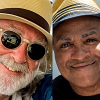Home » Jazz Articles » Catching Up With » Immanuel Wilkins: Omega is Just the Beginning
Immanuel Wilkins: Omega is Just the Beginning

Courtesy Mark Robbins
It's important that there are inner city schools with music programs, there are things that really work toward gender equality, making sure everybody feels welcome in these spaces.
—Immanuel Wilkins
All About Jazz caught up with Wilkins after his stellar Newport set and along with three-time JazzWeek Jazz Programmer-Of-The-Year winner and music director Derrick Lucas of Jazz 90.1 WGMC, Rochester, NY (All About Jazz and Derrick collaborated on this interview, and we identify Derrick Lucas' questions with 'AAJ-DL.') we were able to learn more about Wilkins and his journey from a childhood in Philadelphia to the stage of the Newport Jazz Festival.
All About Jazz-Derrick Lucas: Immanuel, congratulations on that burning set.
Immanuel Wilkins: Thank you, thanks a lot. Happy to be here.
AAJ-DL: Immanuel, tell me what did you learn last year as an artist, as a man with everything that happened?
IW: That's a good question. Wow, what did I learn? I learned to be more patient and to sit on my ideas longer, honestly. That was a good thing about the pandemic, we had time to sit with ourselves and sit with our ideas and actualize them and realize them in the best way possible, so slowing down is important.
AAJ-DL: So, as you know as an artist, a lot of folks just want you to play your saxophone but then there are a lot of people who say, "Say something with your saxophone. Bring social change, do something, make the world a better place." As an artist how do you deal with that, you've got so many different worlds pulling at you but you're an artist, you want to create so how do you handle that?
IW: You know I'm inspired by people like Nina Simone where there is no separation between the artist and the social issues in the world being reflected at the time. So, I think that the artist is responsible for doing that and that is intrinsically bound to playing the music and creating things that respond to the times that we're in. When you think about just influence in general, the well comes from the media tv, radio, whatever I'm listening to. It's impossible, dare I say, as a great musician to not be aware of the times. So, yea, I think it's very important.
AAJ-DL: Who do you perform for, yourself, the musicians on the bandstand, or the audience?
IW: You know I actually go back and forth, I think it's a combination of myself and the musicians on the bandstand. I think the beautiful thing about all types of art is the onlooker gets to listen in and that's the beauty of what we do. The onlooker gets to hear the conversation the musicians are having. A lot of it is an experience for me and an experience for the band mates, I think that the art world is completely, music, movies, everything in the art world exercises that muscle of empathy. The beautiful thing is that we can listen in to what these people are doing and put ourselves into their shoes and go on the journey with them.
AAJ-DL: Immanuel, what does it mean for you to play at the Newport Jazz Festival?
IW: Man, it's a dream, it's an honor. I played here for the first time 2 years ago before the pandemic, the last Newport Jazz Festival, with vibraphonist Joel Ross and they were gracious enough to have me bring my band out this time. You know, as I was playing I was having images going through my head of Trane (John Coltrane) at Newport or Pops (Louis Armstrong) at Newport, you know what I mean, you see pictures and think wow, this is a high honor. I'm thankful, grateful and humbled to be on these hallowed grounds.
AAJ-DL: You work in the school systems, you work with kids. Why is it so important to you to make sure that you can connect the youngsters with this music because so often as you know and you can see so many public schools don't have music programs, don't have instruments anymore and you know the dollars are falling, why is it important for you to keep the dominos from falling?
IW: I think that it's important because we see now at festivals, we see it in the scene at large and, if we really talk about it, it's male-dominated, it's an issue, and it's also white-male-dominated so it's important that there are inner city schools with music programs, there are things that really work toward gender equality, making sure everybody feels welcome in these spaces and create safe spaces for everybody to create music and it is reflected in who we see on the scene. It's starting to happen a lot because people are doing work to make the change. It's beautiful because we need more. You know jazz music has been male-run for a long time and there's been constant erasure of women from the music. I think it's important to do that work to make sure we can change that and it starts in the education system when they're young and create those spaces where everybody has the same equal opportunity, and there's equity in terms of those opportunities for all people.
AAJ-DL: So inside and outside of jazz who have you been listening to these days?
IW: Good question, lets think,.Okay, there's this really great artist Taja Cheek, her stage name is L'Rain, she has a record out called Fatigue (Mexican Summer, 2021) that has been on Sirius loop since it came out. Its a really amazing record.I've also been listening to Ruben Fox who's an amazing tenor saxophonist, he just released a really amazing record Introducing Ruben Fox (Rufiio Records Limited, 2021) and then I've been listening to Coleman Hawkins and listening to a lot of Johnny Griffin.
AAJ: During your set it was like I could see all those great players that came before you nodding their head in approval.
IW: Thank you, that means a lot I try my best but I'm standing on the shoulders of my ancestors so I'm trying to sound like them (laughs)
AAJ: So, who did you listen to back in the day, who influenced you?
IW: Oh man, growing up it was Kenny Garrett that was my first love,soon after that was Ben Webster, Johnny Hodges, those two really sold me. My big brother of sorts was Justin Faulkner, he plays in Branford's (Branford Marsalis) band. So he would come off tour, he had just got that gig he was like 16 I was like 9,10 something like that. Anyway he had just got the gig and he would come off the road and kind of regurgitate all that information to me. Brandford was telling him you need to be checking out Ben Webster, Lester Young, Johnny Hodges so that became an influence of mine, and Fletcher Henderson, so I was getting this like polar situation where I was listening to the big alto saxophonist at the time, Kenny Garrett, the 1990s early 2000s. Then I was getting really older musicians like Johnny Hodges and Lester.They were early influences for me, then it was Charlie Parker and then once I moved to college Ornette Coleman changed my life. Henry Threadgill, Benny Carter, those were my top three.
AAJ: Do you remember your first gig?
IW: Oh, I don't remember my first gig.I have no idea, it was probably at the Clef Club in Philadelphia with Lovett Hines as the director, that basically was a union house back in the day, and they have an education program now. It's deeply integrated into the scene so like my teachers were Ornette's last band, Mickey Roker, Trudy Pitts, just a super amazing cast of people to learn from and I think my first gig was probably through the Clef Club.
AAJ: You started writing your outstanding record, Omega around 2013-2015, were you thinking then that this was going to be an album?
IW: I had no idea it was going to be an album. I figured maybe I'd record it if it started to go well, but I didn't know it was going to be a record until I started playing it with the band I assembled about 4 or 5 years ago and we were like yea, maybe we should record this music. Those tunes had still been in rotation in the repertoire we had and we felt comfortable with that music. Most of the music was written in college but the second half of the album was pretty much written in high school.
AAJ: It was close to a six-year span between the beginning of the album, of what was to become the album, and the finished product. Did you find your style of writing, or your way of writing change over the years? Did you have a different mindset by the time you got to the end?
IW: Definitely, definitely! It was a slow and steady kind of change of repertoire, of how I wrote. It was a challenge, I guess especially for that older music, for it to still feel new and updated and it was kind of a last revival that we had. You know we really don't play that music that much anymore like the stuff I wrote in high school because it's pretty much like that was probably the best, the most alive we could make it. But you know it's interesting, you know music kind of changes over time, every two or three years there's a completely different writing style from before.
AAJ: Do you feel any kind of pressure with the success of Omega for the next one?
IW: No, no. I think it's because we have about five albums of repertoire that we've been playing for a long time. So, we're just on to the next one. I feel even more confident about the other music. You write differently every so often so I'm feeling very confident. But I guess I feel pressure just in a way, being on Blue Note, the legacy of Blue Note, the pressure just to be good. Knowing that Charlie Parker played this music I have to be good! That's where the pressure is, comes from me.
AAJ: Immanuel, thank you so much for taking the time to talk to us. We hope to see and hear you again soon.
IW: Oh, it was my pleasure, thank you.
Tags
Interview
Immanuel Wilkins
Mark Robbins
Newport Jazz Festival
Micah Thomas
Daryl Johns
Kweku Sumbry
Gretchen Parlato
Joel Ross
jason moran
Aaron Parks
Rochester
Philadelphia
newport jazz festival
Nina Simone
John Coltrane
Louis Armstrong
Coleman Hawkins
Johnny Griffin
Kenny Garrett
ben webster
Johnny Hodges
Justin Faulkner
Branford Marsalis
Lester Young
Fletcher Henderson
Charlie Parker
Ornette Coleman
Henry Threadgill
Benny Carter
Clef Club
Mickey Roker
Trudy Pitts
PREVIOUS / NEXT
Immanuel Wilkins Concerts
Support All About Jazz
 All About Jazz has been a pillar of jazz since 1995, championing it as an art form and, more importantly, supporting the musicians who make it. Our enduring commitment has made "AAJ" one of the most culturally important websites of its kind, read by hundreds of thousands of fans, musicians and industry figures every month.
All About Jazz has been a pillar of jazz since 1995, championing it as an art form and, more importantly, supporting the musicians who make it. Our enduring commitment has made "AAJ" one of the most culturally important websites of its kind, read by hundreds of thousands of fans, musicians and industry figures every month.
























